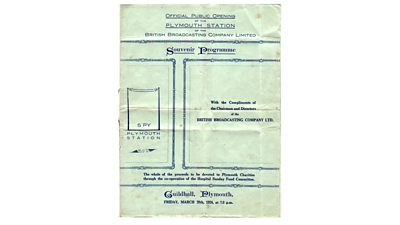Image: Children's Hour staff at work in the 5PY studio. Standing, from the right: Uncle Harry, Uncle Peter, Uncle Monty, Auntie Gwen, Seated: Auntie Madge, Auntie Winnie.
March 28 1924 was a big day for the BBC in the south west - the launch of the first BBC radio station, 5PY based in Plymouth.
Influencers of their day, such as Nancy Astor, the UK's first female politician and MP for Plymouth Sutton, got behind the station. She refused to be involved with the BBC's London station 2LO, preferring instead to speak to her own people through the new station.
She went on to give regular "talks" on literary and political issues, and didn't hold back in bringing major figures to the studio to discuss big issues “on the air".
Guest interviewees were an important early feature of the station. In 1929 George Bernard Shaw was visiting Elliot Terrace at Plymouth Hoe and was booked for the Point of View programme - a sometimes controversial series of talks produced by Hilda Matheson a pioneer of early broadcasting, who was to go on to become the BBC's first Director of Talks. Shaw was characteristically outspoken and the interview went some way in putting the south west on the broadcasting map!
The original Points of View often came to the attention of the BBC's first General Manager, John Reith as the programmes dared to challenge some of his more old-fashioned ideas about society and people.
What gave the BBC in the south west this early sense of independence and uniqueness? On its 100th birthday, here are a few highlights, including the definitive guide to the first 50 years of the BBC in the region - Ian Fell's Peninsula: I Do Like to BBC Beside the Seaside, first seen in 1974.
A grand opening
Such was the novelty of radio in the 1920s, that each station was met with a flurry of publicity and usually a grand opening for local dignitaries. These affairs were an opportunity for prominent local personalities to meet BBC staff, and taste some of the magic of radio.
5PY brought the great and the good together on the night of March 28 1924 at Plymouth Guildhall, donating any money raised to 'Plymouth Charities'.

State of the art studios
Plymouth’s Athenaeum Chambers was the location for the first BBC centre in the south west.
From the outset the variety of programmes broadcast from the cramped studios was impressive, including news bulletins, music recitals, women's and children's programmes.
The studios were state-of-the-art at the time, although looking at original images of the newly equipped centre, they barely resemble what we understand a radio studio to look like in the 21st century - the leisurely sitting room style with sofas and paintings on the walls was typical of the period.
A curious box on a stand was also a standard feature. This was the "meat-safe" microphone. In essence, a metal cage protecting a large microphone that bore a close resemblance to a box for storing meat, seen in kitchens of the 1920s and 30s - hence its name. Performers needed to stand behind the meat-safe to be heard, they rarely sat. A distant control room ensured the sounds picked up made it to the transmitter.

From radio to television
By June 13 1939 the old local 5PY service was retired along with its neighbour 6BM in Bournemouth. As war approached local services were grouped together to allow for co-ordination across the UK for the duration of the conflict, and larger regional services post war.

Truly local stations were to return, however. BBC Radio Devon and BBC Radio Cornwall both launched on 17 January 1983, BBC Somerset Sound on 11 April 1988, and content for Dorset first went live on 26 April 1993.
A dedicated BBC Television news service came to the south west on 20 April 1961 ahead of its commercial rival, and within years on-screen names such as Hugh Scully, Angela Rippon, Sue Lawley, Fern Britton and Jill Dando were beginning their careers in the region.
However, for four years from 1957, south west viewers were part of a much bigger BBC West television region based in Bristol, which claims a UK broadcasting first for women!
Armine Sandford made headlines as the first female BBC regional television newsreader, and south west viewers were there to witness it on 30 September 1957.
BBC South West in 2024
After major refurbishment of its property and technology across the region, BBC South West has moved well beyond one simple Plymouth based radio station, it is now a multi-media operation fit for the 2020s.
On television, Spotlight continues to set the regional news agenda, and an expanded online offer of news, features and videos continues alongside new output from BBC local radio in the area.
Happy 100th birthday BBC South West!
BBC History
________________________________________________________________________________________________
-
BBC News Devon BBC marks a centenary of broadcasting in the South West.
-
Spotlight The regional news programme for the South West of England.
-
Voices of the BBC The story of the BBC, as told by the people who made it.
-
5PY Heritage Images and more interviews with early pioneers of the BBC in the south west.
